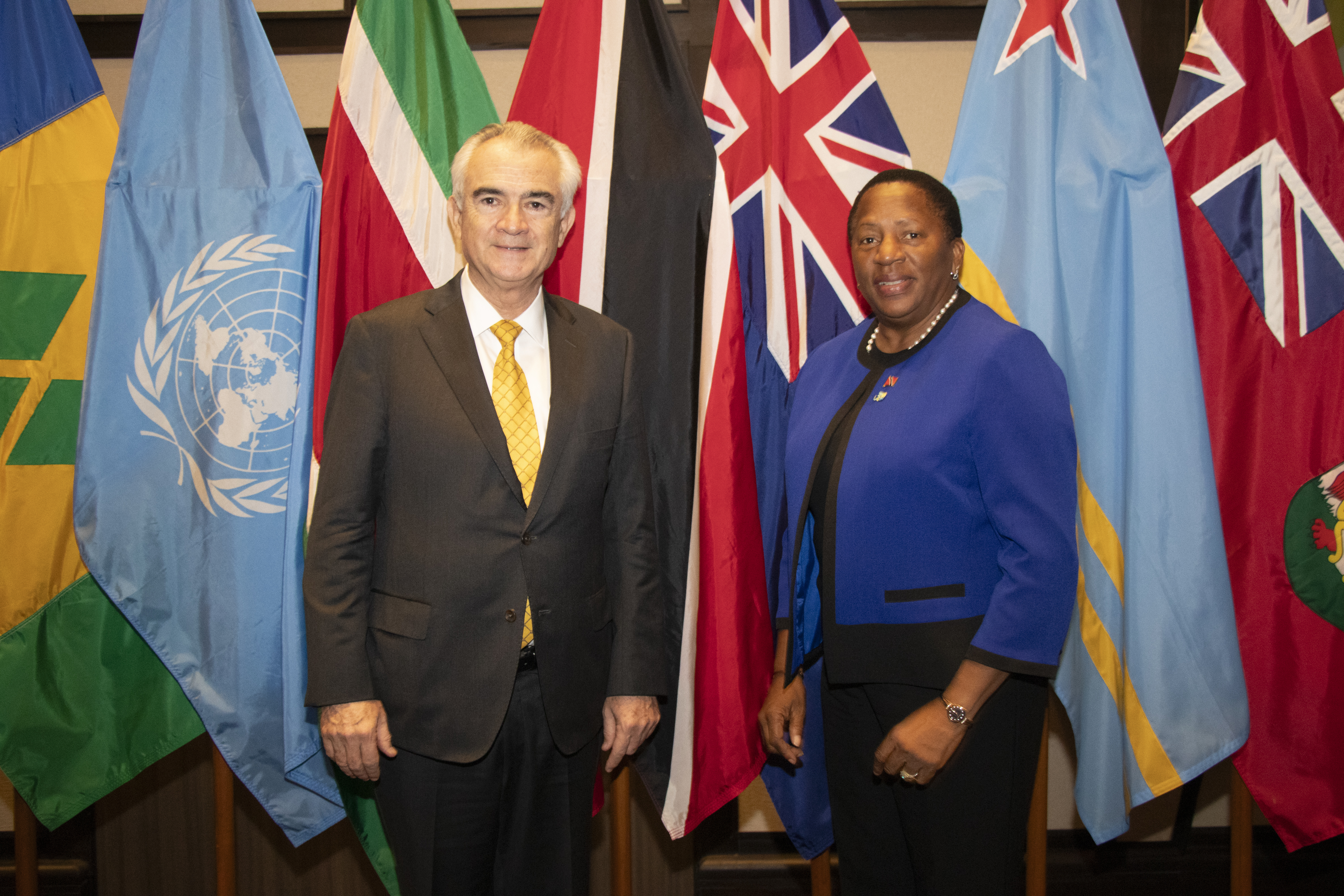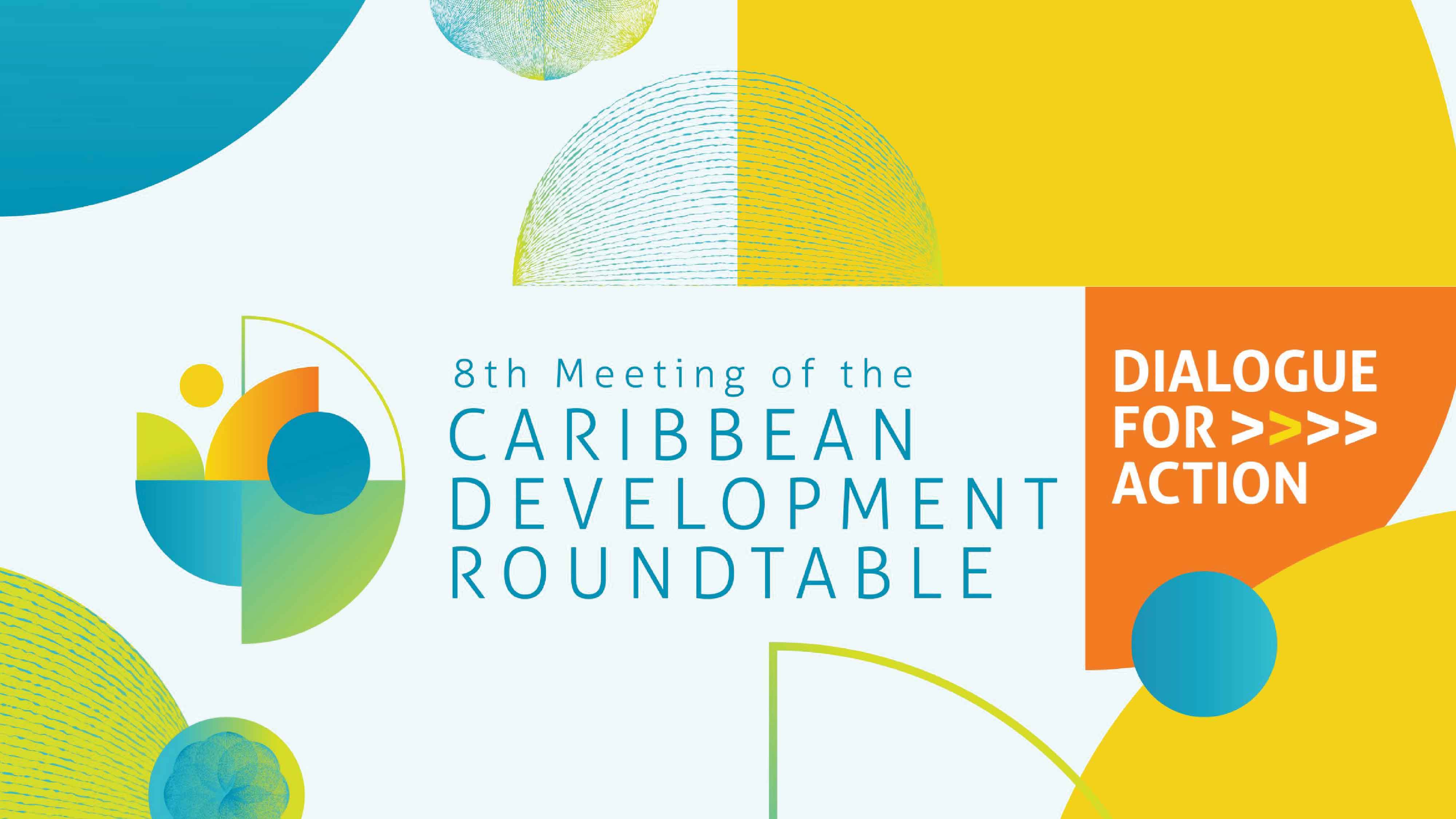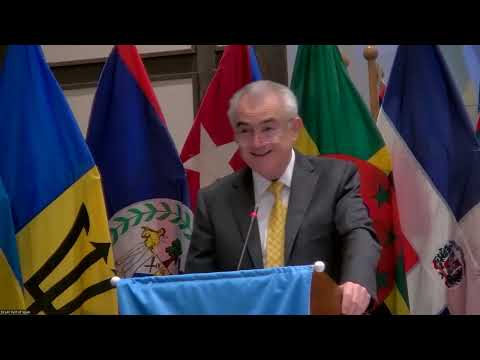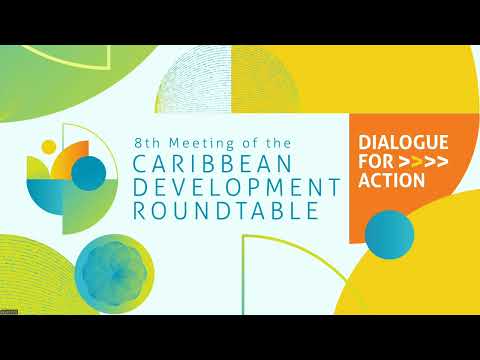ECLAC Executive Secretary: Reconceptualize Economy for Improved Growth and Sustainable Development in the Caribbean… SKN Prime Minister Envisions a Sustainable Island State
Work area(s)
The Eighth Caribbean Development Roundtable (CDR) was inaugurated in Port-of-Spain, Trinidad and Tobago, on Monday 9 September, 2024.

ECLAC Executive Secretary Jose Manuel Salazar-Xirinachs recommends embracing a new vision for productive development policies in the Caribbean. Executive Secretary Salazar-Xirinachs was delivering remarks at the opening ceremony of the Eighth Caribbean Development Roundtable (CDR) in Port-of-Spain, Trinidad and Tobago on Monday. Over the course of two days, the CDR features discussions among 23 Caribbean countries on the topics of confronting climate change; operationalizing the multidimensional vulnerability index; improving access to climate finance; improving productive development policy; and revisiting economic diversification in the Caribbean.
ES Salazar-Xirinachs said many countries in the region have strategies to address development gaps that often fail. “When we look across the Latin American & Caribbean region, we see three development traps: a low capacity to grow trap; a high inequality, low social mobility and weak social cohesion trap; and a low institutional capacity and weak governance trap. The key question is how to get out of these traps.” He suggests that the effective management of these transformations is essential. A major technical capability to be enhanced to facilitate this transformation is data and statistics. He also pointed out that the loss of highly skilled labour through brain drain, in the face of education and training systems which continue to underserve their populations, will need to be urgently addressed if the region is to achieve the high-quality learning and competencies needed to promote strong, knowledge-based economies.
“For confronting these and other challenges, at ECLAC we think it is essential to embrace a new vision on how to shape productive development policies. These policies are crucial for promoting economic dynamism and transformation with three interrelated objectives: first, achieving a more productive economy, that is, a productive system that is more diversified and technologically sophisticated; second, a more inclusive one, in terms of more and better jobs; and third, a greener and more sustainable growth path, because it is also in PDPs that the tools for promoting the green and blue economies lie.”
ES Salazar recalled the Fourth International Conference on Small Island Developing States (SIDS4) at which Caribbean states highlighted the urgency of action for scaling up innovative climate financing and the importance of the Multidimensional Vulnerability Index (MVI) as a key tool in sustainable development. “The diplomacy of small states can be very influential and powerful in all these and other fora and at ECLAC we are also ready and willing to support you on these financing and resource mobilization discussions, as well as on the challenges of productive development and others. The new geoeconomic and geopolitical realities require reevaluating diplomatic strategies, especially for small states, as you must now navigate a web of alliances, rivalries, and conflicting interests in a multipolar world. Do count on us in these efforts.”
Saint Kitts and Nevis Prime Minister Terrance Drew delivered the keynote address on the challenges to resilient growth in Saint Kitts and Nevis. Recalling experiences in his country, like many Caribbean countries, PM Drew said “the path to resilient growth is neither straightforward nor simple.” He added, “a sustainable island state is one where every citizen enjoys a high quality of life today, while preserving these standards for future generations.” He said a vision for a sustainable island state must be built on water security; energy transition; food security; sustainable industry; sustainable settlements; circular economy and social protection. “Security resilience is about protecting our borders and ensuring the safety of our citizens… We cannot build a resilient nation if our people live in fear. Security is the bedrock upon which all other forms of resilience are built.”
Prime Minister Drew made his position clear that the development movement must include buy-in from people, “Resilience is not something that can be imposed from above; it must be built from the ground up. We should continue to work together and chart a course where all of us will benefit and with one voice will have a profound impact.” Presenting on addressing the challenges to economic growth, he said, “For too long, we have relied heavily on our Citizenship by Investment (CBI) programme. While this has been a valuable economic tool, it is not enough. We must diversify our economy to reduce our dependency on any single sector.”
Also speaking was Trinidad and Tobago’s Minister of Planning and Development Penelope Beckles-Robinson, the incoming chair of the Caribbean Development and Coordination Committee. She declared that this is the moment for bold, decisive leadership and innovative solutions to build Caribbean economies and strengthen resilience in the region. “As we gather here for this Caribbean Development Roundtable, it is essential that we carefully examine practical strategies to break down the barriers that hinder resilient growth and sustainable development in the Caribbean.”
The Caribbean Development Roundtable (CDR) is the premier forum for development discussion in the Caribbean. It is where policymakers meet thinkers and stakeholders. It is the engine room for development thinking and cooperative action in the Caribbean. On Wednesday 11 September, the Caribbean Development and Cooperation Committee (CDCC) meets for its 30th session when Suriname will hand over the chairmanship of the Committee to Trinidad and Tobago.
More about ECLAC Caribbean
The mission of the Economic Commission for Latin America and the Caribbean (ECLAC) subregional headquarters for the Caribbean, is to deepen the understanding of the development challenges facing the Caribbean, and to contribute to solutions by conducting research and analysis and providing sound policy advice and technical assistance to Caribbean governments, focused on growth with equity and recognition of the subregion’s vulnerability.
Related event

Related content

Eighth meeting of the Caribbean Development Roundtable
Confronting the challenges to resilient growth and sustainable development in the Caribbean: from dialogue to action post the Fourth International Conference on Small Island Developing States


ECLAC Executive Secretary: Road to Caribbean Sustainable Development not Easy, ECLAC Here to Support… T&T Elected Chair of Caribbean Development and Cooperation Committee
In the 30th session of the Caribbean Development and Cooperation Committee (CDCC) Caribbean ministers, ambassadors and development specialists discussed solutions to pressing development challenges.

Eighth meeting of the Caribbean Development Roundtable (Day 1, Monday 9 September, 2024)
Eighth meeting of the Caribbean Development Roundtable (Day 1, Monday 9 September, 2024). Port of Spain, Trinidad and Tobago. More information in

Eighth meeting of the Caribbean Development Roundtable (Day 2, Tuesday 10 September, 2024)
Eighth meeting of the Caribbean Development Roundtable (Day 2, Tuesday 10 September, 2024). Port of Spain, Trinidad and Tobago. More information in
Subregional headquarter(s) and office(s)
Related link(s)
Country(ies)
- Caribbean
Contact
ECLAC Caribbean media
- spou-pos@un.org
- 868 708 1769